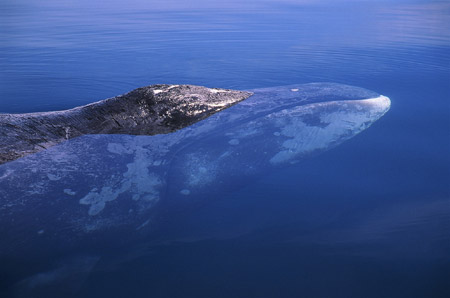Lance points to long living whales
A fragment of a weapon used by commercial whalers in the 1800s was found in a massive bowhead whale caught off Alaska last month, suggesting it may be more than a century old, officials said.
The fragment, from a bomb lance manufactured around 1880, was discovered in a bowhead harvested in the traditional subsistence hunt conducted by Alaska's Inupiat people, said officials from the North Slope Borough, the local government in northernmost Alaska.
The fragment shows that the whale could be nearly 130 years old, said Craig George, a wildlife biologist with the borough's Department of Wildlife Management.
"It was probably at least a yearling when it was struck, because the whalemen never took calves," George said.
The find adds to recent information suggesting that bowhead whales have life spans that extend past a century, he said.
The newly accumulated information includes the discovery of old stone tools, last used in the 1880s, in whales hunted in the early 1990s, as well as analysis of the lenses of whales' eyes, he said.
The Inupiat have long said that bowhead whales live for the equivalent of two human lifetimes, George said. "That's their traditional knowledge. We're still catching up," he said.
While commercial whaling is now banned by international agreement, natives from Alaska, the Chukotka region of eastern Russia and Greenland are permitted to hunt a fixed number of whales for traditional, non-commercial consumption.
In Alaska, meat from hunted whales is distributed to all residents of the hunters' villages.
SaveTheWhales.org
Refs
and further readingHOME
SEARCH
Food kills?
Immortality?
Gut flora/CR
Selegiline.com
Rasagiline.com
Longevitarians
Living Forever?
Immortal Youth?
Longevity Genes
Yoda the Ancient
Caloric Restriction
Supercentenarians
Daf-2 and longevity
Reengineering the body?
Stress, telomerase and aging
New treatments for aging brains
World's Oldest Supercentenarians
Can slight caloric restriction prolong life?

